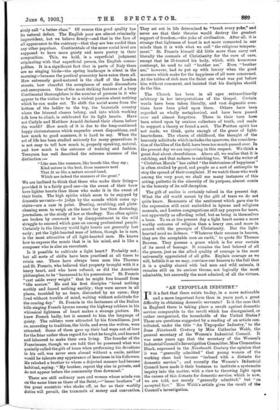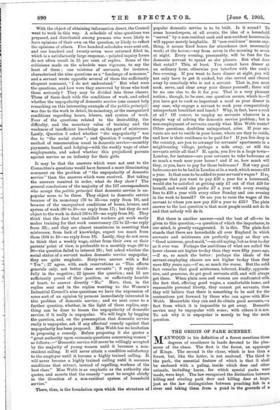"AN UNPOPULAR INDUSTRY."
IS it a fact that there exists to-day, in a more noticeable and a more important form than in years past, a great difficulty in obtaining domestic servants ? Is it the case that in England there is taking place a revolt against domestic service comparable to the revolt which has disorganised, or rather reorganised, the households of the United States P Those are questions suggested by a reading of an article con- tributed, under the title " An Unpopular Industry," to the June Nineteenth Century by Miss Catherine Webb, the general secretary of the Women's Industrial Council. It was some years ago that the secretary of the Women's Industrial Council's Investigation Committee, Miss Clementina Black, expressed in the Nineteenth Century the opinion that it was " generally admitted" that young women of the working class had become " imbued with a distaste for domestic service" ; and recently the Women's Industrial Council have made it their business to institute a systematic inquiry into the matter, with a view to throwing light upon the causes of this distaste for domestic service, which is now, we are told, not merely " generally admitted," but " an accepted fact." Miss Webb's article gives the result of the Council's investigation.
With the object of obtaining information direct, the Council went to work in this way. A schedule of nine questions was prepared, and distributed among persons who were likely to have opinions of their own on the question, or likely to reflect the opinions of others. Five hundred schedules were sent out, and one hundred and twenty-seven were returned filled in, which is a satisfactorily large response,—printed inquiry forms do not often result in 25 per cent. of replies. Some of the criticisms made on the schedule were vigorous, to say the least of them ; one mistress of servants, for instance, characterised the nine questions as a " fandango of nonsense," and a servant wrote opposite several of them the sufficiently eloquent comment, " I do not understand." But what were the questions, and how were they answered by those who took them seriously ? They may be divided into three classes. Three of them dealt with the conditions of work, and asked whether the unpopularity of domestic service (one cannot help remarking on this interesting example of the petitio yrincipii) was due to the work in detail, its monotony, or the unorganised conditions regarding hours, leisure, and system of work. Four of the questions related to the desirability, the difficulty, and the monetary value of training and the weakness of insufficient knowledge on the part of mistresses. Lastly, Question 5 asked whether "the unpopularity" was due to "the social status " ; and Question 9 compared the method of remuneration usual in domestic service—monthly payments, board, and lodging—with the weekly wage of other employments, and asked whether this prejudiced parents against service as an industry for their girls.
It may be that the answers which were not sent to the Committee's questions would have formed a more illuminating comment on the problem of " the unpopularity of domestic service " than the answers which were received. But taking the answers received in order, what do they show ? The general conclusions of the majority of the 127 correspondents who accept the petitio principii that domestic service is un- popular seem to be these. They object to domestic service because of its monotony (76 to 35—no reply from 16), and because of the unorganised conditions of hours, leisure, and system of work (90 to 20—no reply from 17) ; but they do not object to the work in detail (92 to 19—no reply from 16). They think that the fact that unskilled workers get work easily makes training for that work unnecessary (72 to 22—no reply from 33) ; and they are almost unanimous in asserting that mistresses, from lack of knowledge, expect too much from them (104 to 10—no reply from 13). Lastly, they do not seem to think that a weekly wage, either from their own or their parents' point of view, is preferable to a monthly wage (69 to 30—the question failed to interest 28) ; but asked whether the social status of a servant makes domestic service unpopular, they are quite emphatic. Sixty-two answer with a flat " Yes " ; 27 agree, with such reservations as " This affects generals only, not better class servants " ; 3 reply doubt- fully in the negative ; 22 ignore the question ; and 13 are sufficiently proud of their position, or sufficiently humble of heart, to answer directly "No." Here, then, in the replies sent and in the replies wanting to the Women's Industrial Council's nine questions we have the expression of some sort of an opinion by persons immediately interested in this problem of domestic service ; and we next come to a further question, whether, in the light of these replies, any- thing can be done to lessen the unpopularity of domestic service, if it really is unpopular. We will begin by begging the question, and, on the presumption that domestic service really is unpopular, ask if any effectual remedy against that unpopularity has been proposed. Miss Webb has no hesitation in proposing a remedy. Before proposing it she quotes a " great authority upon economic questions concerning women " as follows :—"Domestic service will never be willingly accepted by the majority of young women until it becomes a non- resident calling. It will never attain a condition satisfactory to the employer until it become a highly trained calling. It will never become a highly trained calling until it assumes conditions that attract, instead of repelling, workers of the best class." Miss Webb is as emphatic as the authority she quotes, and asserts that the remedy "must be sought chiefly in the direction of a non-resident system of household service."
There, then, is the foundation upon which the structure of popular domestic service is to be built. Is it sound? To some housekeepers, at all events, the idea of a household " served " by a non-resident cook and non-resident housemaids will appear merely laughable. If "non-residence" means any. thing, it means fixed hours for attendance (not necessarily work) at the house,—say from seven in the morning to seven at night. Every evening, presumably, will be free for the domestic servant to spend as she pleases. But what does that entail ? This, at least. You cannot have dinner at an ordinary hour, otherwise you interfere with the cook's free evening. If you want to have dinner at eight, you will not only have to get it cooked, but also served and cleared away by somebody who is not a servant. That is, you must cook, serve, and clear away your dinner yourself ; there will be no one else to do it for you. That is a very pleasant notion ; though, to be sure, one question occurs, which is,—If you have got to cook so important a meal as your dinner in any case, why engage a servant to cook your comparatively unimportant breakfast and lunch ? Why, in fact, have a cook at all ? Of course, to employ no servants whatever is a simple way of solving the domestic service problem; but is non-employment of servants exactly what Miss Webb wants? Other questions, doubtless unimportant, arise. If your ser- vants are not to reside in your house, where are they to reside, and how is their residence to be paid for? If you live deep in the country, are you to arrange for servants' apartments in a neighbouring • village, perhaps a mile away, or will the servants settle all that ? If, again, you live in a large town— London, for instance—are your servants to take bedrooms at so much a week near your house ? and if so, how much will they, or you, have to pay for those bedrooms ? Not very good bedrooms are to be had in London at 5s. a week, which means £13 a year. Is that sum to be added to your servant's wages ? If so, suppose that you want to pay £20 a year for a housemaid, would she be satisfied at getting only £7 out of that £20 for herself, and would she prefer £7 a year with every evening free to £20 a year with every other Sunday and one evening in the week to herself ? Or are you to raise the wages of the servant to whom you now pay £20 a year to 233 ? The plain answer to the last question is that most people could not do it, and that nobody will do it.
But there is another answer—and the best of all—to be given to this question,—a question of which the importance, to our mind, is greatly exaggerated. It is this. The plain fact stands that there are households all over England in which servants and mistresses are perfectly happy as they are. " Good mistress, good maid,"—an old saying, but as true to-day as it ever was. Perhaps the ambitions of what are called the lower classes are higher to-day than they were fifty years ago, —if so, so much the better : perhaps the ideals of the servant-employing classes are not higher to-day than they were fifty years ago,—if so, so much the worse. But the solid fact remains that good mistresses, tolerant, kindly, apprecia- tive, and generous, do get good servants still, and will always get them. When plain men and women are confronted with the fact that, offering good wages, a comfortable home, and reasonable personal liberty, they cannot get servants, then they will believe that there is something to be said for the contentions put forward by those who can agree with Miss Webb. Meanwhile they can and do obtain good servants,—a fact from which it is impossible to get away. Domestic service may be unpopular with some ; with others it is not. To ask why it is unpopular is merely to beg the main question.











































 Previous page
Previous page